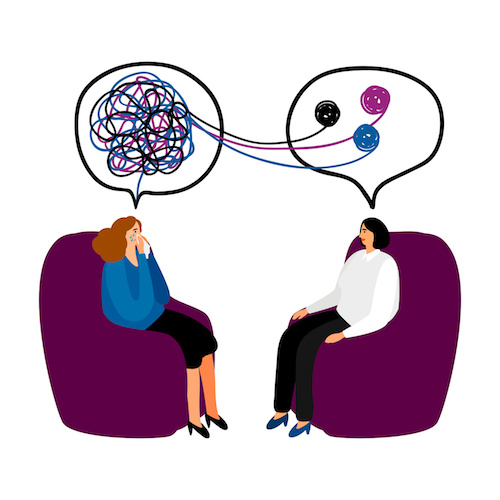If you are new to therapy you may be wondering what to expect. A therapist is a mental health professional with a specific Master’s degree (at minimum) education and experience. During my graduate program I had to gain 300 hours of experience as an intern. Post graduation I gained over 3,000 logged hours of experience in different areas before getting my license in Marriage and Family Therapy. A therapist helps others find their strengths and courage to confront and make sense of difficult emotions and experiences so they can learn and thrive in their lives. They may help you develop better cognitive and emotional skills to reduce symptoms of mental illness or cope with various life challenges in order to improve the quality of life. At the very least, a therapist is someone you can talk to and be your authentic self.
I like the image above because it shows how therapy can help you make sense of your feelings and experiences. Before I take on a new clients I will schedule a brief phone consultation to see if we are a good fit to work together and to make sure I can meet your needs. I will ask you questions about what is bringing you to therapy and your presenting symptoms (depression, anxiety, relationship distress etc). You will have the opportunity to ask me questions as well.
Not everyone knows what ask their potential therapist. Here are some questions to ask your potential therapist:
- Do you have experience with ____ issue or disorder?
- What is your therapeutic style? (To learn about mine, read this blog)
- What is your cancellation policy?
- How long have you been practicing?
- Do you do in person or telehealth and any plans to change that?
- How can you help me around ___ issue?
- Can you provide a super bill? (for those with PPO insurance and seeing a provider out of network)
- What is your fee?
If we decide to move forward with scheduling an appointment, before our first session I will send you documents to review and sign. We will review insurance and/or set the fee for services then I will gather information to better understand what you hope to gain from therapy. Do you want to improve your mood or interpersonal skills such as communication? Perhaps you are looking to grieve a loss or process an old wound. Regardless of what brings you to therapy, my goal is to lend you a helping hand and guide you toward realizing your own strengths and abilities that will help you navigate through life’s challenges.
During the first session we will complete an intake where I will gather more extensive information about your presenting problem and history. I use this time to get to know you and your history a little better. It helps if you can provide me with as much information as possible but you are always encouraged to share only what you feel comfortable with. We have plenty of time to get to know each other as the weeks and months go on. I always set therapy goals at the beginning of therapy with my clients. This is often a requirement by Insurance companies but also allows me to track progress. Therapy ends when your goal has been reached or when my services no longer serve you. While therapy is a collaboration, remember that it is YOUR therapy and we go in the direction you want. You set the pace.
Do I need a diagnosis? If you are paying for your sessions using insurance then, yes. This is because in order for insurance to pay for sessions there needs to be medical necessity through a diagnosis in the DSM. Your therapist will discuss this with you after the intake, if they do not you can always ask if they are giving you a diagnosis with insurance. Insurance requires this after the first session but the diagnosis may change as you continue therapy and your therapist gets to know you better. If you do not use insurance you are not required to get one but may always ask. Many find it helpful to receive a diagnosis in order to label or better understand their experience.
What will sessions look like? This is a common question I also get from first timers to therapy. In order for me to help guide you in therapy I need a good idea of what you want to work on. This is why I set treatment goals on the first session during the intake. It also helps if before each session you think about things you want to talk about. Some may want to bring up something from their week. Others may want to address trauma or issues from their past. Many will bring up issues with general mental health such as depression or anxiety which will help us both navigate the session. Based on that info we may process information, build insight, review coping strategies, problem solve or just practice sitting with and recognizing feelings. It’s your life so it’s important that you take an active role in therapy. If I direct the session it may not be productive or beneficial to you. That doesn’t mean I won’t contribute and do my part, it just means that you are captain of the ship and I follow your lead.
What if I can’t deal with silence? Hey, therapy is sometimes awkward and that’s ok! Silence isn’t anything to be afraid of and if we allow it, something powerful may come from it. Try not to end the session in a rush when we experience times of silence. Silence can be very normal so just allow yourself to be present in session. Notice if anything comes up for you. Notice your body sensations. If you are just blanking on a topic for the day, now worries. We will reflect on those treatment goals.
What if I end up not liking my therapist or their style? That is totally okay! Not everyone is a great fit. Hopefully the consultation process will allow each person time to see if they like what they hear and if they think they can work together. If issues arise in therapy or you have a reaction to something your therapist says or does, it’s an important and helpful part of the process to address that directly with the therapist. If it can be addressed or corrected your therapist will want to do that because their role is to help you and make you feel heard. If it’s not something that can be addressed then that may mean that therapist isn’t the best fit for you. Some people are tea drinkers and some people are coffee drinkers; neither is wrong, just different. Much like dating, friends and medications, it is important to find what works for you. No hard feelings!
Whether it’s your first time in therapy or you are an experienced participant, asking for help can be scary! I’m so glad you are here. If you are ready to take the leap, fill out the below consultation request form.

